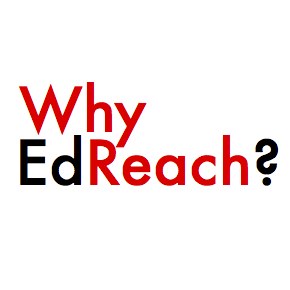 Today is the official launch of EdReach.us, the educational media network, a collaboration by educators from all over the United States.
Today is the official launch of EdReach.us, the educational media network, a collaboration by educators from all over the United States.
Why EdReach?
Do we really need another Educational blog? There are so many others out there- aren’t there enough?
Well, that is true, there are a lot of voices out there. So many voices. So many, it seems that it’s getting harder and harder to hear them, harder to cut through the volume and rate of information, harder to even keep up with well-known colleagues, and harder to be heard.
EdReach.us aims to cut through this.
The EdReach Educational Media Network (EdReach.us) aims to gather these voices together, and create one stream of educational news, blogs, commentary, and interactive media that highlights the innovation, highlights the ideas, highlights the cutting-edge best practices that are happening in the world’s schools every day. Read the rest of this entry…
one
[SWF]http://brueckei.org/jsb_content/currere_engage/pinar.swf, 440, 260[/SWF]
Full Screen Version of Learning Object
This semester I’m enrolled in an independent study with Dr. Lisa Lenhart and Dr. Jennifer Milam from the University of Akron. The course is Introduction to Curriculum Theory, one which isn’t currently offered as a part of the College of Education’s Curriculum and Instruction doctoral program. The main text we are using to guide our discussion of curriculum theory is William F. Pinar‘s 2004 work, “What is Curriculum Theory?” From the course syllabus:
Curriculum theory is, then, about discovering and articulating, for oneself and with others, the educational significance of the school subjects for self and society in the ever-changing historical moment. As a consequence, curriculum theory rejects the current “business-minded” school reform, with its emphasis on test scores on standardized examinations, academic analogues to “the bottom line” (i.e., “profit”). It rejects the miseducation of the American public” (Pinar, 2004, p. 16).
As I’ve been working my way through the text, one of the concepts I’m trying to understand more deeply is the significance of the re-conceptualization of curriculum studies. After reading the first few chapters, it’s quite clear that Pinar has some issues with the historical context of curriculum theory. In fact, he is very intent on voicing his opinion regarding the complexities and contradictions of curriculum theory and practice as most educators know it.
Read the rest of this entry…
one

eTech Ohio is hosting the 2010 Ohio Educational Technology Conference — an idea factory for P-20 education — from February 1-3, 2010 in Columbus, Ohio. On Tuesday, February 2, 2010 from 3:45 PM – 4:30 PM, Ohio educators Toby Fischer (@futureofedu) and Jeremy Brueck (@brueckj23) will be leading a panel discussion titled “Leading for 21st Century Learning: What Every Ohio Adminstrator Needs to Know.”
Panelists we hope to include:
Description from online conference planner:
As Ohio becomes the 14th state to join the Partnership for 21st century skills, what does this mean for district leaders? This interactive session will showcase promising practices, stories, and behaviors linked to 21st Century leadership success. Topics include ethical leadership, sustaining a culture of learning, professional development, and promoting instructional and curriculum excellence.
Read the rest of this entry…
none
Over the past 3 months I’ve found myself turning more and more to my Personal Learning Network on Twitter for reading recommendations. While RSS and my Google Reader account has significantly decreased the amount of time I spend filtering through various websites in search of interesting and relevant articles, I think that adding Twitter to the mix helps me make even better use of my time. For example, I came across this tweet from @willrich45 the other morning.
Pupils to study Twitter and blogs? Twitter and blogs caught my eye like flashing lights, plus I figured an article worth a tweet from @willrich45 is most often worth the time investment.
none

Hirsch prefaces his piece by pulling an Obama quote from a recent speech on education reform. Specifically, the one where the President calls for children to have the skill set to do more than just fill in bubbles on Scan-tron sheets. Hirsch then takes a minute to make a case that standardized tests aren’t all bad, but rather the U.S. educational system takes the wrong approach, indicating that children are often asked to read passages that are not “knowledge neutral” and given randomly to students with out a context.
Children are asked to read and then answer multiple-choice questions about such topics as taking a hike in the Appalachians even though they’ve never left the sidewalks of New York, nor studied the Appalachians in school.
none
Last night on Twitter, Bud Hunt commented that Writing in the 21st Century by Kathleen Blake Yancey was a must read for educators. Since I’ve had that pdf on my desktop for a week or two now, I lamented back that my reason for not reading yet. My pathetic excuse back is outlined in our tweetversation below.

Read the rest of this entry…
none
 Today is the official launch of EdReach.us, the educational media network, a collaboration by educators from all over the United States.
Today is the official launch of EdReach.us, the educational media network, a collaboration by educators from all over the United States.




